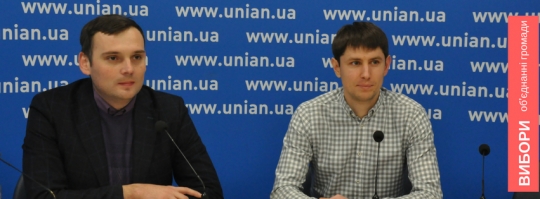The unusually low level of pre-election activity on the part of potential and registered candidates participating in election process, isolated cases of violation of legal requirements by candidates, public conflict between supporters and opponents of integration of territorial communities – such are the peculiarities of first elections in the united territorial communities scheduled for December 11 and December 18, 2016, which were recorded by public observers of Civil Network OPORA in October – November, 2016.
On December 1, Civil Network OPORA held a press conference which was dedicated to the results of the first stage of election process in the united territorial communities. Similarly to 2015 regular local elections, formation of election districts in terms of ensuring approximately equal number of registered voters in each of constituencies was one of the most problematic issues facing territorial election commissions. According to OPORA’s analyst Olexandr Klyuzhev, there were several recorded cases of revision of TEC decisions on formation of election districts. In particular, Vinnytsia and Chernihiv District Administrative Courts invalidated the decisions of Nemyriv and Nosivka city election commissions correspondingly on formation of territorial election districts. Furthermore, OPORA’s observers detected specific problems in the process of formation of election districts, namely the absence of street names in the records submitted by bodies responsible for maintenance of State Register of Voters (Ivano-Frankivsk oblast). In some territorial communities TEC decisions on formation of election districts caused dissatisfaction among voters (Odesa and Mykolayiv oblast).
It should be noted that the unfinished discussion on feasibility of integration of territorial communities led to stopping of election process in Richkivskiy united rural territorial community (Bilopillya rayon in Sumy oblast). There were also protests against integration of territorial communities in the following villages: Postolne (Sumy rayon, Sumy oblast), Antonivka (Chemerivtsi rayon, Khmelnytsky oblast), Olkhivka (Kherson oblast).
“Delayed publication of TEC decisions and denial of observers’ access to decisions of election commissions were quite widespread violations during first local elections, - said Olga Aivazovska, coordinator of electoral and parliamentary programs of Civil Network OPORA. – Meanwhile, the lack of material and technical resources was the key obstacle in the work of election commissions (lack of workspace, means of communication and computers). Nevertheless, the majority of TECs, which were formed for holding first local elections in territorial communities on December 11 and December 18, exercise their powers in accordance with legal requirements, while ensuring sufficient level of organization of work”.
Civil Network OPORA reported that several new parties, which didn’t nominate their candidates in 2015 regular election, participate in local elections in the united territorial communities. OPORA’s observers also recorded isolated cases of agreement between groups of parties on nomination of joint candidates. Thus, nomination of All-Ukrainian Union “Svoboda” candidate for mayor of Talne, Olexiy Yurchenko, was supported by 5 political parties. However, inadequate notification of date, time and place of meetings for nomination of candidates by local organizations of political parties remains a common practice in this election.
According to OPORA’s experts, absence of mass refusals to register candidates and the resulting conflicts is a positive feature of first local elections in the united territorial communities. However, registration documents were submitted to TECs in the last days of registration period prescribed by law. In some territorial communities there were recorded cases of registration of candidates with partially or fully identical names, which can be misleading for voters.
“Although officially registered candidates didn’t launch strong campaigns in the run-up to first local elections scheduled for December 11 and December 18 in the united territorial communities, the lack of transparency in campaign finance still remains a major problem in local elections in Ukraine, - said Olexandr Klyuzhev. – Candidates aren’t in a hurry to disclose information on their electoral funds”.
“Nomination of current officials of local self-governing authorities (namely village, township and city mayors) for election is a notable trend in the first local elections in the united territorial communities, - said OPORA’s analyst Olexandr Neberykut. - Deputies of different levels of local councils and officials of state administrations are also among those running in election race”. Observers emphasize that these categories of candidates made extensive use of formal events, local development programs, social activities and reporting on achievements in development of local communities over the previous term of office in an attempt to attract the attention of voters, which creates conditions for violation of the principle of equal opportunity for all candidates. In addition, some of the candidates prior to their registration performed certain activities that constitute bribery of voters.
Involvement of national or regional politicians in election campaigns in the run-up to first local elections scheduled for December 11 and December 18 in the united territorial communities wasn’t a widespread practice, but such cases were still recorded (MP Fedir Negoi, head of Chaplynka rayon council and mayor of Grygorivka village, who is also a potential candidate, organized a meeting on reconditioning of local roads with participation of residents of united territorial community. Meanwhile, MP Olexandra Kuzhel held a meeting with residents of Starovyshnevetske village, which falls within jurisdiction of Rozdorskiy township council located in Synelnykove rayon of Dnipropetrovsk oblast after integration of territorial communities; several officials of oblast administrations and rayon authorities participated in the conferences of local organizations of political parties).
However, voters don’t show much interest in electoral process, they aren’t up-to-date about its progress and don’t know much about candidates. Furthermore, voters have insufficient information about peculiarities of conduct of first elections in the united territorial communities.
Reference information:
Civil Network OPORA conducts observation of first local elections scheduled for December 11 and December 18, 2016, in 185 united territorial communities. OPORA’s independent observation campaign covers all stages of election process and includes cooperation with law enforcement authorities for the purpose of prevention and detection of violations of electoral law, as well as collection and analysis of statistical information about first local elections in the united territorial communities.
